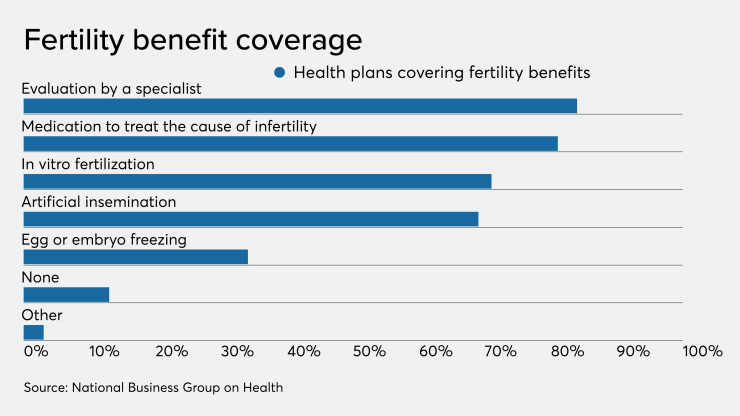During the COVID-19 pandemic, we are all evaluating what matters most to our organizations and our teams. Whether at home or in the office, our employees need more support than ever and benefits are one way to give it. Employers should consider the benefits that provide maximum value to employees, fortify culture, and impact the bottom line.
One example that provides maximum impact to employees, saves employers money, and speaks volumes to a company’s culture is fertility and family building benefits.
Infertility affects every organization
Reproduction is "an essential human right that exists regardless of race, gender, sexual orientation, or country of origin." However, the lack of adequate resources for fertility and family building treatment can delay parenthood or even end someone’s journey before it begins.
The incidence of infertility is high,
But fertility treatments are expensive. The cost of care for a successful outcome usually runs up to $70,000, which is prohibitive, forcing many employees to abandon their dreams of becoming parents because the toll — financial, emotional, and physical — is just too high.
The need for a comprehensive solution
Managing increasing healthcare costs and mitigating high-cost claims is a top priority, especially now. When it comes to the complexity of infertility, applying the traditional approach is ineffective at best, and wasteful at worst, because outdated plan designs exclude advances in care and do not meet the personalized treatment needs of today’s patients.
For example, a type of coverage we see most often is a fixed dollar benefit. Typically, the coverage is between $15,000 to $25,000, which means individuals will face difficult treatment decisions and exhaust the benefit long before they reach a successful outcome. This is also problematic since rates vary by type of clinic and geography. Employees in San Francisco or New York, for example, will exhaust their benefit faster than employees in other parts of the country.
Another pain point is that plan designs are often restricted by pre-certifications and mandated therapies. Not only can these restrictions preclude LGBTQ+ employees from utilizing the benefit, but they may also force employees to undergo less effective treatments that eat into the dollar cap.
All of these things compel many to make cost-based treatment decisions resulting in poor treatment outcomes such as multiple embryo transfer, which often results in twins or triplets. These multiples not only put the parent and babies at risk but also leave employers to foot the bill for the high-risk maternity care and the neonatal intensive care unit (NICU).
On the other hand, comprehensive managed benefits, accessible to all employees, protect organizations against unexpected costs, and give employees the support necessary to get the best treatment the first time.
Fertility treatment is one of the unique areas that require outcomes data to be reported to the CDC each year. Because of this, a managed
When employees and their physicians develop and pursue customized, effective treatments the first time, there is a significantly higher chance for a successful, healthy singleton pregnancy.
Easy integration and service
In this year when HR teams are struggling with the effects of the pandemic, even highly impactful benefits must require minimal effort to implement. This process should be driven by a dedicated individual who understands how to seamlessly integrate the solution with the company’s medical carrier to ensure infertility is covered like other diseases and conditions.
The benefit should provide employers with exceptional service and have a dedicated account manager to give detailed reports on clinical outcomes and cost transparency and be there for any and every question.
It should also provide employees with the same white-glove service and education throughout their fertility journey, especially since fertility journeys are often complex, stressful, and filled with anxiety.
Reinforce company culture
Comprehensive fertility and family building benefits for all employees support a diverse workforce and send an important message of inclusivity. Building a strong corporate culture is essential, especially in the current environment.
Now is the time to reinforce company values. Equality and family are important to all employees, not just the 1 in 8 who struggle with infertility. Elevating both as priorities for the organization in this time of crisis will win hearts, minds, and families.






